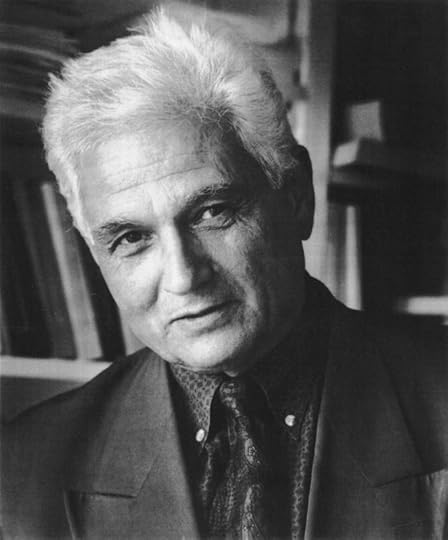Deconstructivism
 Jacques DerridaSimple Deconstructivism
Jacques DerridaSimple Deconstructivism What follows is a post of mine on Goodreads when I was asked to explain Decomstructivism in a simple way.Ok, to understand Deconstructivism, the first thing to do is look at a philosophical concept and semiotics in conjunction. Heraclitus, one of the oldest philosophers of Ancient Greece, and someone whom I think Western Thought should consider more carefully, states that the concept of opposition between two things, two ideas, is necessary for the very existence of these two ideas, thus, the two ideas are mutually innate: if I say evil, I implicitly deny good. There's no good without evil and vice versa.
To understand Deconstructivism we need to be able to bypassed our conditioned thinking whereby one excludes the other; on the contrary, one needs the other for it's own existence.
Where Derrida pushes the exploration is into the very nature of this apparently paradoxical thought. Let us apply it to language. Whenever we put two or more words within a syntactical structure, we create a relationship between/ among these words. Taking a simple sentence, 'I love you,' by doing so we have created a complex semantic system whereby 'I', 'love' and 'you' are organised so that the speaker has created a preferential way of representing reality. What the speaker is saying is that the speaker 'loves' a person defined as 'you'. This is what Derrida calls 'authorial genesis' id est the ability of a writer (or thinker, in general) to create a complex reality by making choices in both paradigm (the choice of words) and syntagm (how these words are linked). The thinker could have changed such genesis by saying, 'I love chocolate' (paradigm) or 'You love me' (syntagm): in both cases, what the thinker expresses is different from our original statement.
The very possibility, though, of this difference is important, as it tells us about the intentions of the thinker, who has chosen to define his or her thought by a series of oppositional choices: this, to start with, gives us an insight into the intentions of the thinker. Why did he or she choose the word 'love' for example. And in choosing so, the speaker has also introduced, vide Heraclitus, the concept of 'hate' as well, one could suggest, as 'indifference', 'like' 'loathe' etc... In order to define 'love' we need to exclude all that isn't love: Derrida calls this 'differance' (spelt with the a): difference is a textual necessity, every text is made up of what is in it, as well as what has been left out but implied in it.
Just going back to our sentence, the syntax has united three different words, each with its own differance: 'I' is not 'she' as 'you' is not 'chocolate'. Thus, if it is true that in order to define 'I' I must imply 'not I', a simple sentence such as our 'I love you' opens up an already impressively huge number of possible interpretation, if we stop just thinking only about what the text says, and start thinking about what the author has decided not to insert in the text.The corollary is that there is no final interpretation of the text.
Let us put our sentence in context; 'I' might have hated 'you' first, in which case, the very sentence 'I love you' also implies not just 'I don't love you' but 'I have experience hatred towards you, thus my love is conscious of hatred for you'. Let me be romantic with the lower case for a while: if you have experienced love that comes from hatred, or switches, that is not the same feeling as love that is simply defined by its opposition to hatred but has not made hatred part of itself. Imagine this on the scale of a novel: the possibilities of interpretation become almost infinite.
When we say that a Deconstructivst interpretation of a text is impossible, we mean that any interpretation creates alternative interpretations, thus, the stress should be on 'a'. Every text has, if we interpret it, an aporia (from Greek, α (without) ποιος = passage): it is a point at which the text reaches a point where it stops reflecting its structural meaning, a point where there is no meaning that can be conveyed through thought, as interpretations are, as we have seen, infinite.
Published on December 15, 2014 02:44
No comments have been added yet.



